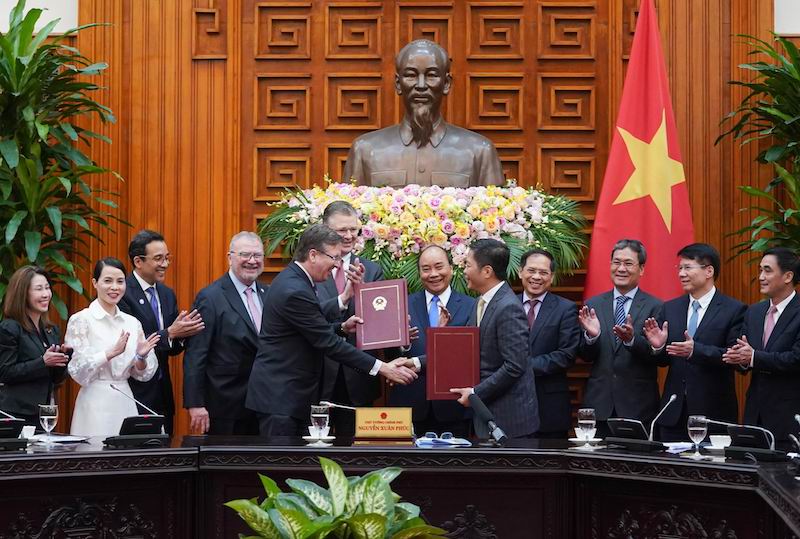Effective Covid-19 response will further boost Vietnam’s status as an attractive market: AmCham
On the occasion of the 25th anniversary of the US-Vietnam diplomatic relations, Adam Sitkoff, executive director of AmCham Hanoi, has shared with Hanoitimes his thought about US-Vietnam relations and the outlook of economic ties.
This year, Vietnam and the US celebrate 25 years of diplomatic relations and the remarkable changes that have occurred. It is a credit to the Vietnamese and American people that two countries have been able to move beyond the tragedies of the shared past to build such a vibrant and strong friendship.
Adam Sitkoff, executive director of AmCham Hanoi |
One of the relationship’s strengths is its multifaceted nature. Economically, the US is a key trading partner and investor for Vietnam. Politically, Vietnam and the US share the same interest: peace and stability in East Asia, and mitigating the impact of the Covid-19 pandemic that has upended lives, jeopardized employment for millions, and disrupted the global trading system on which both nations depend.
The two countries now have a strong friendship anchored in mutual respect and work closely in many areas including regional security, education, global health, food and energy security, disaster response and more.
Of equal importance are cultural links. The US has the largest population of Vietnamese people outside Vietnam. Americans of Vietnamese ancestry are playing a critical role in Vietnam’s development. Their investment as well as their talent and entrepreneurship have helped drive Vietnam’s impressive economic growth.
Back in 1995, only 60,000 Americans visited Vietnam. Last year’s total was almost 700,000 visitors and AmCham hopes to accelerate that growth once international travel normalizes after the pandemic.
In addition, there are over 30,000 young Vietnamese people studying in the US, where they are acquiring much-needed skills and knowledge.
Impressive trade growth
Witnessed by Prime Minister Nguyen Xuan Phuc, Vietnamese Minister of Industry and Trade Tran Tuan Anh and US-ABC President Feldman exchanged a Memorandum of Understanding in March. Photo: VGP |
Trade is the cornerstone of the bilateral relationship and great changes have taken place in the development of the American business community here. Soon after the resumption of economic relations, a small group of Americans founded the American Chamber of Commerce (AmCham) at its first meeting at the Dragon Hotel near West Lake in April 1994.
AmCham members have contributed significantly to the transformation and growth of Vietnam’s economy and many of the longtime members were instrumental in helping normalize the bilateral relationship.
Together, AmCham members represent billions of dollars in foreign investment, tens of thousands of direct employees, hundreds of thousands of indirect employees, and a significant share of Vietnam’s exports and tax revenues.
Business activity started slowly for Americans here, but now the Cham saw US companies and investors active in almost every sector of Vietnam’s economy. US exports to Vietnam have more than quadrupled in the last decade, and the US remains the largest export market for Vietnam, even during this terrible pandemic.
Prospects for the future
A discussion between representatives from Vietnamese and the US startups at Techfest Vietnam 2019 held in the US in September, 2019. |
Looking towards the future, AmCham hopes both governments can begin efforts towards a bilateral Free Trade Agreement. This would improve investment and trade flows, would assist sustainable supply chains, and would improve business conditions that strengthen the private sector, ensure sustainable economic and social development, and promote prosperity here.
Many of the American investors I have worked with are optimistic about business prospects in Vietnam. AmCham supports efforts to create a modern economy that will attract future investment and high-paying jobs for Vietnamese people.
For Vietnam to be successful, non-productive red tape must be controlled and the country’s regulatory framework must be stable and predictable. Many business people remain concerned with changes in policy and regulations which are not consistent with international best practices.
AmCham encourages continuous improvements in infrastructure development, protection of intellectual property, education reform, legal and tax policy certainty, and enhanced transparency in Vietnam.
Maybe most important is to enact smooth, fair, and consistent tax and audit procedures. Too often, US investors feel there is an arbitrary and unpredictable audit and tax system. Progress in these areas will not only help attract more foreign investment, but will also will support Vietnam’s aspirations to propel itself to the next sphere of economic competitiveness.
With a growing trade imbalance, it is critical that our members encounter an equal, level, and predictable playing field as a solid foundation, not only to attract new investment, but also to maintain and grow the investment that is already here.
In addition, AmCham recommends that foreign investment limitations, an overly restrictive legal framework of laws, and burdensome administrative procedures should be carefully reviewed and selectively relaxed to encourage increased US investment.
Everybody has an interest in Vietnam’s continued success. That is why actions that increase productivity and reduce the costs and risks of doing business here really help the business climate for all investors – regardless of where they are from. In fact, decreasing the cost and complication of doing business benefits Vietnamese-owned businesses the most because many are small businesses.
Challenges to address
I have lived and worked in Hanoi for almost 20 years and I see great opportunity and a bright future here. This year, however, is proving to be quite challenging for many people. The economic implications of the pandemic for Vietnam are severe and will impact people for quite some time.
Millions of jobs have disappeared, many people have seen their salaries cut, and business activity in most sectors remains slow. The number of people receiving unemployment benefits in the first half of the year rose 32% year-on-year, and Vietnam’s economic growth in the second quarter fell to its slowest pace since the country started publishing economic data in 1991. Even as the economy begins to recover, the financial pressure for many companies will be significant.
While the future is unknowable, the Vietnamese people have done an outstanding job to contain the spread of the virus. This success enabled a fast start on the path to economic recovery and the government’s effective response to the pandemic will further boost Vietnam’s status as an attractive market.















